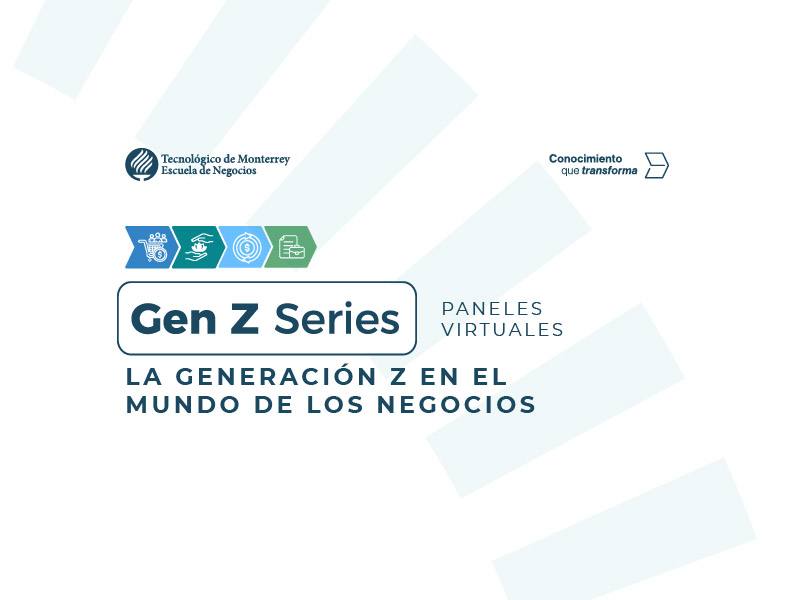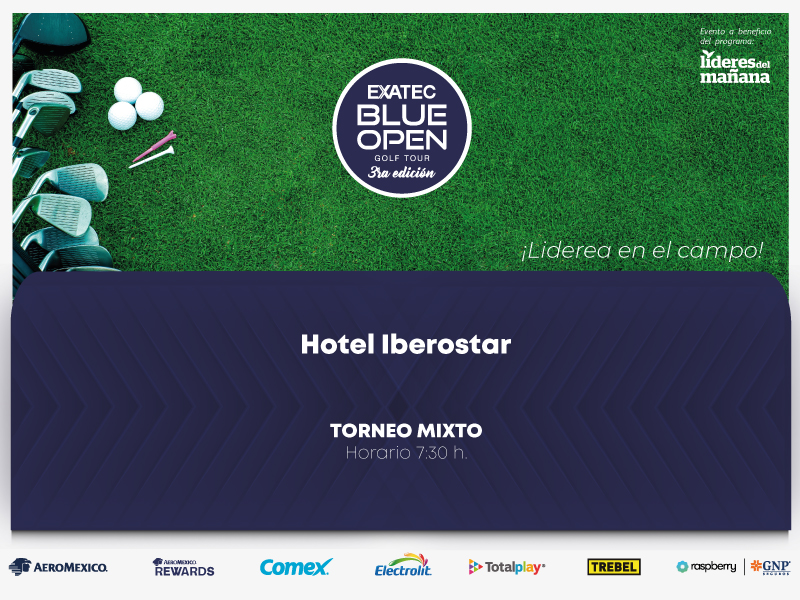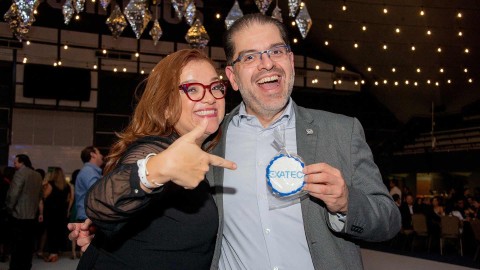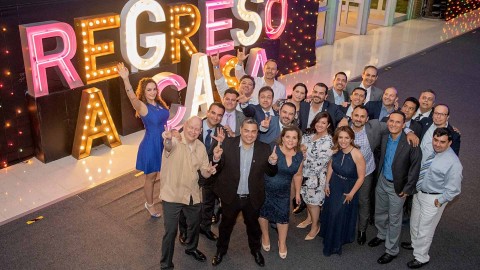Buscar
Gen Z Series | Paneles virtuales
En línea.
Inicia
Termina
Dirigido a
Organiza

¡La generación Z ha llegado al mundo de los negocios, y es momento de conocerla a profundidad!
¿Sus integrantes prefieren el trabajo virtual? ¿Dónde compran y qué artículos prefieren? ¿Es la generación más ecológica y preocupada por la salud mental? ¿Ahorra para el retiro?
Regístrate y conéctate a nuestros paneles virtuales con expertos.
¡No te la pierdas! Regístrate aquí.
Comunicación Escuela de Negocios
International scholarships
Erasmus+ scholarships
Call Summer 2025
University of Trento, Italy
With the aim of promoting internationalization and providing new opportunities that contribute to students' academic, professional, and personal development, Tecnológico de Monterrey, in collaboration with the University of Trento and with the support of the Erasmus+ program, is publishing this call for financial support scholarships so that more students can enjoy an academic experience abroad during their professional studies in the summer of 2025.
Purpose
The School of Innovation from the University of Trento is organizing the "Shaping the Future of Chocolate" Summer Challenge within the framework of the European Consortium of Innovative Universities (ECIU) forum. The program combines online and in-person activities from May 13 to June 11. The activities consist of five online sessions and one in-person week in Trento, scheduled from June 7 to 11, 2025. In-person attendance at Trento during this week is mandatory, and four scholarships will be awarded for airfare and subsistence expenses.
This is an opportunity to work on an innovative and sustainable food solution. This challenge fosters creativity, analytical skills, and strategic thinking through practical experience.
Who Can Apply?
· Students enrolled at a professional level, from any academic program on the Tecnológico de Monterrey campuses.
· Students without academic experience abroad.
-
Erasmus+ Grant
-
Learning outcomes
-
Requirements
-
Application Process
-
Selection Committee
-
Commitments of Selected Students
-
Contact Information
-
Seleccionados
-Support of up to €1,735 for flight purchases to the destination country.
-Support of up to €632 for living expenses (food and lodging) during the week of in-person activities in the city where the university is located.
*Any other expenses not covered by the scholarship are the responsibility of the selected student (e.g., international health insurance).
· Develop strategic thinking skills by gaining hands-on experience in analyzing B2B market dynamics and identifying high-potential business opportunities.
· Strengthen problem-solving and teamwork skills.
· Enhance market analysis capabilities by learning how to assess industry trends, customer needs, and competitive landscapes to support decision-making.
· Master go-to-market strategies by understanding how to position an innovative product.
· Develop compelling marketing and communication strategies tailored to B2B audiences.
· Explore international market trends and sustainability challenges in the food industry.
· Develop real-world business strategies for sustainable food innovations.
· 4 ECTS credits (Does not award TEC academic credits).
· Up to 6 points toward an International Diploma.
1. Have an interest in technology, marketing, sustainability, or entrepreneurship.
2. Applicants must be regular students during the February–June 2025 semester.
3. An overall grade point must be greater than or equal to 95.
4. Have a socioeconomic scholarship from the Tecnológico de Monterrey of at least 50% or further.
5. Be enrolled from the 5th semester onwards.
6. Have a graduation date after June 2025.
7. English level B2 or higher.
8. Not having cursed any program abroad (Summer, Winter or Semester) during your undergraduate studies.
9. Not be academically or disciplinary-conditioned.
10. Have a passport valid until at least December 2025.
Complete the registration form at the following link: Application Form, attaching a copy of your passport and resume, before April 24, 2025, at 3:00 PM.
The selection is by an evaluation committee of experts from Tecnológico de Monterrey, and their selection will be final and incontestable. The Vice-Rectory for International Affairs will contact the finalists on Friday, April 25, 2025.
Selected students agree to:
a) Complete their program registration to receive their acceptance letter and scholarship.
b) Complete the online activities to participate in in-person activities.
c) Send a copy of their international health insurance to the Vice Rectory for International Affairs before their trip.
d) Upon their return, submit a written statement to the Vice-Rectory for International Affairs and attach photographs and a video documenting their academic experience.
e) Submit the documents requested by the University of Trento as part of the Erasmus+ program.
More information about the program; https://www.soi.unitn.it/micromodules/shaping-the-future-of-chocolate/
For further questions or additional information, please contact the Vice Rectory for International Affairs at itesmvi@servicios.itesm.mx.
La Vicerrectoría de Internacionalización agradece a todos los estudiantes que participaron en esta convocatoria y enviaron su expediente.
De acuerdo con el comité evaluador, los alumnos seleccionados para representar al Tecnológico de Monterrey en el programa de verano Challenge “Shaping the future of chocolate” de la Escuela de Innovación de la Universidad de Trento son:
A00836130
A01737086
A00836540
A01643328
Becas internacionales
Becas Erasmus+
Convocatoria Verano 2025
Universidad de Trento, Italia
Con la intención de promover la internacionalización y brindar nuevas oportunidades que contribuyen al desarrollo académico, profesional y personal del estudiante, el Tecnológico de Monterrey en colaboración con la Universidad de Trento y el apoyo del programa Erasmus+, publican esta convocatoria de becas de apoyo económico para que más estudiantes puedan vivir una experiencia académica en el extranjero durante sus estudios de profesional en el periodo de verano de 2025
La Escuela de Innovación de la Universidad de Trento organiza en el marco del fórum del Consorcio Europeo de Universidades Innovadoras (ECIU) el verano Challenge “Shaping the future of chocolate” el programa combina actividades en línea y presenciales del 13 de mayo al 11 de junio. Las actividades se componen de 5 sesiones en línea y una semana presencial en Trento programada del 7 al 11 de junio de 2025. La presencialidad en Trento durante esta semana es obligatoria por lo que se otorgarán 4 becas para gastos de avión y manutención (hospedaje y alimentación).
Esta es una gran oportunidad para trabajar en una solución alimentaria innovadora y sostenible. Este reto impulsa la creatividad, las habilidades analíticas y el pensamiento estratégico a través de experiencia práctica.
Se invita a participar a:
· Estudiantes de nivel profesional de los 26 campus del Tecnológico de Monterrey.
· Estudiantes que no han tenido una experiencia académica en el extranjero.
Ver convocatoria aquí
-
Erasmus+ Grant
-
Learning outcomes
-
Requirements
-
Application Process
-
Selection Committee
-
Commitments of Selected Students
-
Contact Information
-
Seleccionados
-Support of up to €1,735 for flight purchases to the destination country.
-Support of up to €632 for living expenses (food and lodging) during the week of in-person activities in the city where the university is located.
*Any other expenses not covered by the scholarship are the responsibility of the selected student (e.g., international health insurance).
· Develop strategic thinking skills by gaining hands-on experience in analyzing B2B market dynamics and identifying high-potential business opportunities.
· Strengthen problem-solving and teamwork skills.
· Enhance market analysis capabilities by learning how to assess industry trends, customer needs, and competitive landscapes to support decision-making.
· Master go-to-market strategies by understanding how to position an innovative product.
· Develop compelling marketing and communication strategies tailored to B2B audiences.
· Explore international market trends and sustainability challenges in the food industry.
· Develop real-world business strategies for sustainable food innovations.
· 4 ECTS credits (Does not award TEC academic credits).
· Up to 6 points toward an International Diploma.
1. Have an interest in technology, marketing, sustainability, or entrepreneurship.
2. Applicants must be regular students during the February–June 2025 semester.
3. An overall grade point must be greater than or equal to 95.
4. Have a socioeconomic scholarship from the Tecnológico de Monterrey of at least 50% or further.
5. Be enrolled from the 5th semester onwards.
6. Have a graduation date after June 2025.
7. English level B2 or higher.
8. Not having cursed any program abroad (Summer, Winter or Semester) during your undergraduate studies.
9. Not be academically or disciplinary-conditioned.
10. Have a passport valid until at least December 2025.
Complete the registration form at the following link: Application Form, attaching a copy of your passport and resume, before April 24, 2025, at 3:00 PM.
The selection is by an evaluation committee of experts from Tecnológico de Monterrey, and their selection will be final and incontestable. The Vice-Rectory for International Affairs will contact the finalists on Friday, April 25, 2025.
Selected students agree to:
a) Complete their program registration to receive their acceptance letter and scholarship.
b) Complete the online activities to participate in in-person activities.
c) Send a copy of their international health insurance to the Vice Rectory for International Affairs before their trip.
d) Upon their return, submit a written statement to the Vice-Rectory for International Affairs and attach photographs and a video documenting their academic experience.
e) Submit the documents requested by the University of Trento as part of the Erasmus+ program.
More information about the program; https://www.soi.unitn.it/micromodules/shaping-the-future-of-chocolate/
For further questions or additional information, please contact the Vice Rectory for International Affairs at itesmvi@servicios.itesm.mx.
La Vicerrectoría de Internacionalización agradece a todos los estudiantes que participaron en esta convocatoria y enviaron su expediente.
De acuerdo con el comité evaluador, los alumnos seleccionados para representar al Tecnológico de Monterrey en el programa de verano Challenge “Shaping the future of chocolate” de la Escuela de Innovación de la Universidad de Trento son:
A00836130
A01737086
A00836540
A01643328
Collaborators


Colaboradores


EXATEC Germany

Board Members
EXATEC Francia
Contact information

Board Members
Regreso a Casa
Vuelve a tu alma mater y reencuéntrate con tus compañeros de generación en una fecha inolvidable.

Directorio de egresados
¿Te gustaría reconectar con tus compañeros de generación? Conoce el Directorio de egresados en mitec EXATEC (menú izquierdo).

Seguros exclusivos
¡Tu bienestar y el de tus seres queridos es lo más importante! Ponemos a tu disposición una amplia oferta de seguros exclusivos para EXATEC.

Mis beneficios
Día con día pensamos en tu bienestar y el de tus seres queridos. Y queremos que tengas lo que necesitas cuando lo necesitas: ¡al alcance de tu mano!
¡Regresa a casa!
Reencuéntrate con tus compañeros de generación en una fecha inolvidable
Esta oportunidad solo sucede cada cierto tiempo, ven y actualiza tus contactos, no te pierdas de la experiencia de esta reunión.
¡Te esperamos!
Relaciones con Egresados
Tecnológico de Monterrey
Para mayores informes,
EXATEC Blue Open Golf Tour 2025 Cancún
Iberostar Golf Club Cancún
Inicia
Dirigido a
Organiza





